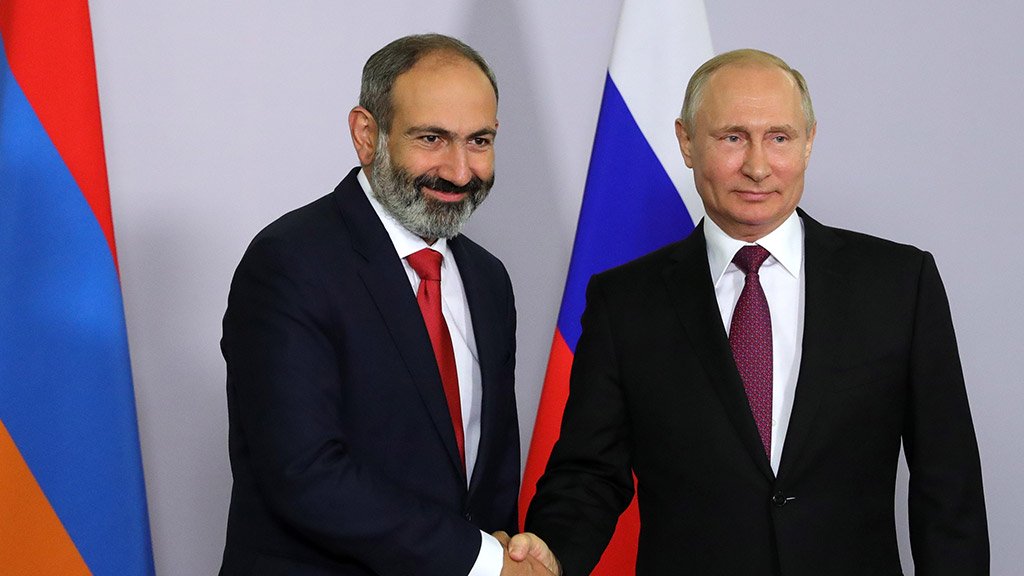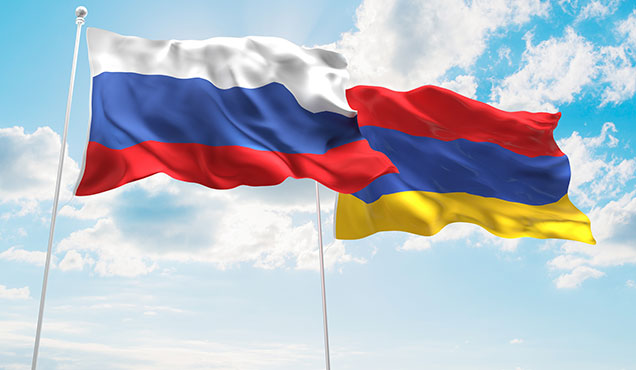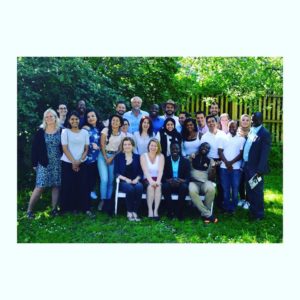A pivot towards the West is simply not in Armenia’s best interest.
Immediately after the “Velvet Revolution” in Armenia during the spring of 2018, the main narrative regarding possible developments in Armenian and Russian relations focused on negative expectations. Conventional wisdom brought plenty of reasons for such a mood. Russian authorities do not like leaders who come to power through street demonstrations, and Russia mainly exerts power in its neighborhood through a network of corrupt and oligarchic elites. Therefore, any genuine democratisation threatens Russian influence. In the case of Armenia, there are also other mitigating issues. Some key members of the new administration had previously worked in Western-funded NGOs that are regarded as hostile organisations in Russia; while in opposition, they often criticised Russia and overtly spoke about Armenia’s dangerous overdependence on the country.

Armenian Prime Minister Nikol Pashinyan and Russian President Vladimir Putin meet May 14 in Sochi, Russia. The meeting was the first between the two men, as Armenian-Russian relations enter a fraught period. (photo: kremlin.ru)
The criminal investigation opened against Collective Security Treaty Organisation Secretary-General Yuri Khachaturov and the arrest of former President Robert Kocharyan, who is largely perceived as a staunchly pro-Russian politician with personal connections to President Vladimir Putin, only exacerbated the negative expectations.
The disappearance from Armenia’s political arena of the former Prime Minister Karen Karapetyan, who had high-level personal and business contacts in Russia and was expected to take the position of Prime Minister after the April 2018 transition to a parliamentary republic could also contribute to Russia’s unease.
However, the Russian reaction to the events in Armenia from April to May of 2018 was surprisingly quiet. It is difficult to assess the main reason for this. It is possible that Russia was too surprised to make any strong action or was confident that due to the Karabakh conflict and absence of relations with Turkey, Armenia could not afford to break with Russia, regardless of who holds power. Meanwhile, high-level contacts between the two countries began immediately after the election of Nikol Pashinyan as Prime Minister. During the first year in his new capacity, Pashinyan had five meetings with the Russian president: on May 14th, June 13th, September 8th, and December 27th of 2018, as well as on June 6th, 2019.
Since November of 2018, the active bilateral meetings have been launched at different levels, including parliamentary commissions, intergovernmental committees, commissions on military-technical issues, and discussions between various agencies. As a goodwill gesture towards Russia, Armenia’s new leadership agreed to send a humanitarian mission to Syria, a suggestion supposedly rejected by the former President Serzh Sargsyan.
With the exception of criminal persecution of former President Kocharyan and Armenia’s abstention from voting on the UN General Assembly’s resolution regarding Abkhazia and South Ossetia, the country’s new administration has done little to agitate its Russian counterparts.
It should be noted that the April and May 2018 “Velvet Revolution” in Armenia has the potential to bring about substantial changes domestically but offers little in the way of changing the geopolitical reality surrounding Armenia. The key issue for Armenia’s security has long been and will probably continue to be the Karabakh conflict. Despite limited optimism within the international community and Azerbaijan that the new Armenian authorities may take a more flexible approach no substantial changes have occurred. The new Armenian leadership insists that the return of Nagorno-Karabakh representatives to the negotiation table is the only viable way to reach a lasting peace agreement because it has no authority to negotiate on behalf of Karabakh.
This demand is firmly rejected by Azerbaijan. In late September of 2018, an agreement was reached between Armenian and Azerbaijani leaders to decrease the tensions on the line of contact and re-establish a military hotline. The agreement was largely kept until June of 2019, when rising tensions resulted in several casualties. January and March 2019 meetings of the Armenian Prime Minister and the President of Azerbaijan, in addition to January, April and June meetings between the two foreign ministers have brought no breakthroughs.
The rising tensions among the line of contact can be interpreted as a sign of growing Azerbaijani frustration and a return to a policy of brinksmanship and blackmail that threatens Armenia and Karabakh with war if they do not implement Azerbaijani demands. The Azerbaijani administration’s message to its domestic audience regarding the strength of the Azerbaijani army and the victory of Azerbaijan in the April 2016 four-day war has only increased Azerbaijani society’s inclination towards the use of force.
As a result of the 2016 war, Armenian society’s position on the Karabakh issue has hardened. Few people in Armenia are ready to discuss any solution which entails a change of Karabakh’s current borders. Thus, negotiations have effectively deadlocked and created an increased possibility of hostilities resuming.
Armenian relations with Turkey have frozen as well. Armenia is not among the top foreign priorities for Turkey. Ankara’s focus is on Syria, the Kurds, United States relations regarding the S-400/F-35 conundrum, and Turkey’s growing economic wounds. Turkey’s position towards Armenia remains the same; no improvements are expected until the situation in Karabakh improves and Karabakh forces withdraw from some territories.
The United States “maximum pressure” campaign against Iran has created additional complications for Armenia. Iran, along with Georgia, is the gateway for Armenia to the outside world, and any significant decrease in Iran-Armenia relations will significantly damage vital Armenian national interests.
The United States demands that Armenia significantly decrease its relations with Iran, drift away from Russia, abstain from additional contact with China and normalise relations with Azerbaijan and Turkey as conditions for large-scale financial support. These onerous requirements do not bode well for the development of Armenia–United States relations. Armenia simply cannot afford to implement American demands, and for this reason, there will most likely be no qualitative change in United States–Armenia relations soon. Washington will provide some small-scale assistance to Armenia for various reforms, but it will never come close to the scale of support provided to Georgia on the eve of the “Rose Revolution”.
Armenian–EU relations are based on the Comprehensive and Enhanced Partnership Agreement signed in November of 2017 before the “Velvet Revolution” and developed within the general framework of the Eastern Partnership initiative launched in 2009. Given Armenia’s rejection of the proposed association agreement in late 2013, acceptance into the Eurasian Economic Union in 2015, and the deterioration of Russian relations with the West after the events in Ukraine during 2014, signing the CEPA was a significant step for Armenia. The agreement provisionally came into force in June of 2018. The CEPA implementation roadmap was finalised by the Armenian Government in the beginning of June 2019 and was approved during the second Armenia–EU partnership council meeting held on June 13th, 2019.
The key areas of mutual cooperation in CEPA are education, justice reforms, support to SMEs, and energy efficiency. Armenia anticipates increased EU support on its path to democratic transition. However, within the Eastern Partnership, the EU’s focus is Ukraine, as well as other Association Agreement signatory states Georgia and Moldova. The EU is willing to support Armenia in different areas of reforms but has little to offer in terms of hard security, the Karabakh conflict, or relations with Turkey.
It is in the national interest of Armenia to foster its strategic alliance with Russia and take steps to deepen cooperation with China. This is the only way to prevent any territorial losses, which would put the physical security of the Armenia and Karabakh population at significant risk. This is the main reason why Armenia’s new leadership has taken action to emphasise the significance of a further strategic alliance with Russia and assure Russia of its foreign policy orientation. From the mid-term perspective of 5 to 10 years, there is no other power that could provide the minimum level of necessary security guarantees for Armenia. Both Moscow and Yerevan understand this equation well, and all talk regarding the significant deterioration of Armenia–Russia relations is being used to serve Armenian domestic political purposes or information warfare implemented by Azerbaijan.
The article was originally published at New Eastern Europe on 9/7/2019
Dr. Benyamin Poghosyan is Executive Director, Political Science Association of Armenia holding this position since February 2011. He was Vice President for Research – Head of the Institute for National Strategic Studies at the National Defense Research University in Armenia in August 2016 – February 2019. He joined Institute for National Strategic Studies (predecessor of NDRU) in March 2009 as a Research Fellow and was appointed as INSS Deputy Director for research in November 2010. Before this, he was Foreign Policy Adviser of the Speaker of the National Assembly of Armenia. Dr. Poghosyan has also served as a Senior Research Fellow at the Institute of History of the National Academy of Sciences and was an adjunct professor at Yerevan State University and in the European Regional Educational Academy.
His primary research areas are geopolitics of the South Caucasus and the Middle East, US – Russian relations and their implications for the region. He is the author of more than 70 Academic papers and OP-EDs in different leading Armenian and international journals. In 2013, Dr. Poghosyan was appointed as a Distinguished Research Fellow” at the US National Defense University – College of International Security Affairs and also, he is a graduate from the US State Department’s Study of the US Institutes for Scholars 2012 Program on US National Security Policy Making. He holds a Ph.D. in History and is a graduate from the 2006 Tavitian Program on International Relations at Fletcher School of Law and Diplomacy.







